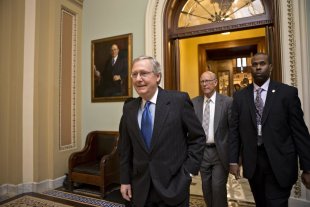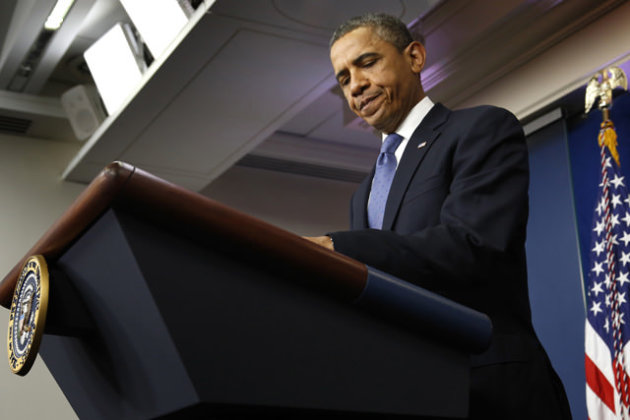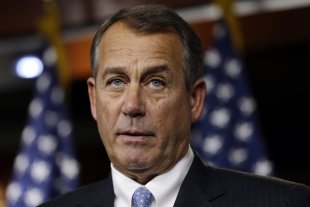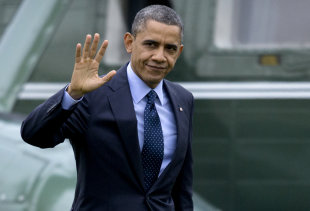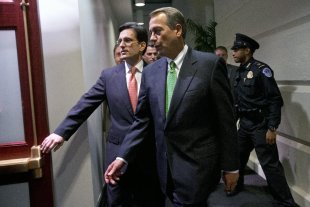 House Majority Leader Eric Cantor, R-Va., left, with Speaker of the House John Boehner, R-Ohio, head into a closed-door …Updated 11:38 pm ET
House Majority Leader Eric Cantor, R-Va., left, with Speaker of the House John Boehner, R-Ohio, head into a closed-door …Updated 11:38 pm ET
The House of Representatives late Tuesday easily approved emergency bipartisan legislation sparing all but a sliver of America’s richest from sharp income tax hikes -- while setting up another “fiscal cliff” confrontation in a matter of weeks.
Lawmakers voted 257-167 to send the compromise to President Barack Obama to sign into law. Eighty-five Republicans and 172 Democrats backed the bill, which had sailed through the Senate by a lopsided 89-8 margin shortly after 2 a.m. Opposition comprised 151 Republicans and 16 Democrats.
Republican House Speaker John Boehner voted in favor of the deal, as did House Budget Committee Chairman Paul Ryan, his party's failed vice presidential candidate. But Republican House Majority Leader Eric Cantor and Majority Whip Kevin McCarthy voted against it.
Obama, speaking from the White House briefing room shortly after the vote, praised lawmakers for coming together to avert a tax increase that “could have sent the economy back into a recession.”
“A central premise of my campaign for president was the change the tax code that was too skewed toward the wealthy at the expense of working, middle-class Americans. Tonight, we’ve done that,” the president said.
But he signaled that the legislation was “just one step in the broader effort” of getting the nation’s finances in order while boosting growth and job creation.
“The deficit is still too high,” he said, warning Republicans that he would stick with his demands for a “balanced” approach blending spending cuts with revenue increases, notably from the rich and wealthy corporations.
Republicans vowed a renewed focus on cutting government outlays.
“Now the focus turns to spending,” Boehner said, vowing his party would “hold the president accountable for the balanced approach he promised, meaning significant spending cuts and reforms to the entitlement programs that are driving our country deeper and deeper into debt.”
As debate began, Republican House Ways and Means Chairman Dave Camp heralded “a legacy vote” that amounted to a victory for his party because Democrats agreed to make permanent the tax cuts his party enacted in 2001 and 2003. Camp called the bill a step towards reforming the country’s “nightmare” tax code and described it as the largest tax cut in history.
Representative Sander Levin, the top Democrat on Camp’s committee, claimed victory because the vote shattered “the iron barrier” Republicans maintained for 20 years against raising taxes.
It fell to Democratic Representative Charlie Rangel to admit “this is no profile in courage for me to be voting for this bill” because “we created this monster.”
The polarized House approved the measure, unchanged, after House Republican leaders beat back a day-long insurrection within their ranks fueled by conservative anger at the bill’s lack of spending cuts. A final vote was expected late Tuesday evening.
“They’re crazy, but they’re not that batshit crazy,” Democratic Representative Alcee Hastings told reporters as the Republican plan came into focus.
Hastings’s blunt assessment came after a day in which Republican leaders at times seemed to be as much political arsonists as firefighters in the face of rank-and-file GOP anger at the bill.
The House seemed on track to torch the legislation, a hard-fought bipartisan bill crafted by Vice President Joe Biden and McConnell that sailed through the Senate by a lopsided 89-8 margin in a vote shortly after 2 a.m.
The compromise bill averts the sharpest tax increase in American history. But it hikes rates on income above $400,000 for individuals and $450,000 for households, while exemptions and deductions the wealthiest Americans use to reduce their tax bill face new limits. The accord also raises the taxes paid on large inheritances from 35% to 40% for estates over $5 million. And it extends by one year unemployment benefits for some two million Americans. It also prevents cuts in payments to doctors who treat Medicare patients and spares tens of millions of Americans who otherwise would have been hit with the Alternative Minimum Tax. And it extends some stimulus-era tax breaks championed by progressives.
The middle class will still see its taxes go up: The final deal did not include an extension of the payroll tax holiday. A report released by the non-partisan Congressional Budget Office Tuesday complicated matters further. It said that the Senate-passed compromise would add nearly $4 trillion to the federal deficit over 10 years.
Despite the overwhelming Senate vote, the accord landed with a thud in the House, where Cantor surprised lawmakers by coming out flatly against the deal during a morning closed-door meeting of House Republicans. Cantor’s announcement fueled conservative anger at the absence of spending cuts in a measure that had originally been considered a likely vehicle for at least some deficit-reduction. The results fed fears that the legislation was doomed.
Republican leadership aides played down the drama by insisting that “the lack of spending cuts in the Senate bill was a universal concern amongst members in today’s meeting.”
After grappling with the insurrection all day, Republican leaders gave their fractious caucus a choice during an emergency 5:15 p.m. meeting: Try to amend it or go for a straight up-or-down vote on the original deal.
Cantor and Boehner “cautioned members about the risk in such a strategy,” according to a GOP leadership aide.
House Rules Committee Chairman David Dreier, emerging from the gathering, bluntly told reporters “it’s pretty obvious” that amending the legislation and sending it back to the Senate would kill it. Democrats and Republicans in the upper chamber had signaled that lawmakers there would not take up a modified version of what was already a difficult deal.
The resulting pressure on GOP leaders was immense: Absent action to avert the fiscal cliff, Americans would face hefty across-the-board income-tax hikes, while indiscriminate spending cuts risked devastating domestic and defense programs. Skittish financial markets were watching the dysfunction in Washington carefully amid warnings that going off the so-called cliff could plunge the fragile economy into a new recession.
Defeat would have handed Boehner a fresh embarrassment by blocking a measure he explicitly asked the Senate and White House to negotiate without him but vowed to act on if Republicans and Democrats could reach a deal. Public opinion polls had shown that Republicans would have borne the brunt of the blame for fiscal cliff-related economic pain.
Republicans had also fretted about the message if final passage came on the back of a majority of Democratic votes, a tricky thing for Boehner two days before he faces reelection as speaker. (In the hours before the vote, conservative lawmakers played down the risks of a rebellion against the Ohio lawmaker).
Time ran short for another reason: A new Congress will take office at noon on Thursday, forcing efforts to craft a compromise by the current Congress back to the drawing board.
Efforts to modify the first installment of $1.2 trillion in cuts to domestic and defense programs over 10 years -- the other portion of the “fiscal cliff,” known as sequestration -- had proved a sticking point late in the game. Democrats had sought a year-long freeze but ultimately caved to Republican pressure and signed on to just a two-month delay while broader deficit-reduction talks continue.
That would put the next major battle over spending cuts right around the time that the White House and its Republican foes are battling it out over whether to raise the country's debt limit.
Republicans have vowed to push for more spending cuts, equivalent to the amount of new borrowing. Obama has vowed not to negotiate as he did in 2011, when a bruising fight threatened the first-ever default on America's obligations and resulted in the first-ever downgrade of the country's credit rating.
“I will not have another debate with this Congress over whether or not they should pay the bills that they have already racked up through the laws that they passed,” he warned Tuesday. “The consequences for the entire global economy would be catastrophic.”
The president then left for Hawaii to rejoin his family on vacation.
As House Republicans raged at the bill, key House Democrats emerging from a closed-door meeting with Biden expressed support for the compromise and pressed Boehner for a vote on the legislation as written.
“Our Speaker has said when the Senate acts, we will have a vote in the House. That is what he said, that is what we expect, that is what the American people deserve…a straight up-or-down vote,” Democratic House Minority Leader Nancy Pelosi told reporters.
Conservative activist organizations like the anti-tax Club for Growth warned lawmakers to oppose the compromise. The Club charged in a message to Congress that “this bill raises taxes immediately with the promise of cutting spending later.”
President Barack Obama had previously declared that “this agreement is the right thing to do for our country and the House should pass it without delay.”
There were signs that the 2016 presidential race shaped the outcome in the Senate. Republican Senator Marco Rubio, widely thought to have his eye on his party’s nomination, voted no. Republican Senator Rand Paul, who could take up the libertarian mantle of his father Ron Paul, did as well.
In a sign of deep GOP unease over the legislation, Republican leaders Boehner, Cantor, and McCarthy did not speak during the debate. Democratic leaders Nancy Pelosi, Steny Hoyer, and James Clyburn all did.
Biden's visit -- his second to Congressional Democrats in two days -- aimed to soothe concerns about the bill and about the coming battles on deficit reduction.
“This is a simple case of trying to Make sure that the perfect does not become the enemy of the good,” said Democratic Representative Elijah Cummings, one of the chamber’s most steadfast liberals. “Nobody’s going to like everything about it.”
Asked whether House progressives, who had hoped for a lower income threshold, would back the bill, Cummings said he could not predict but stressed: “I am one of the most progressive members, and I will vote for it.”


